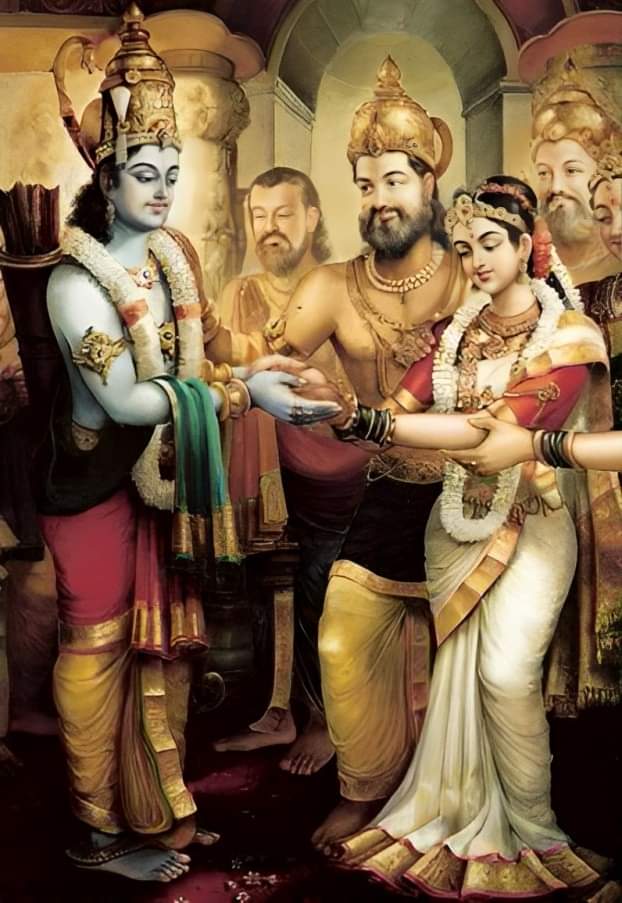More than being just a historical description, the pastimes of Lord Rama crossing the ocean to fight Ravana and rescue Sita carry a lot of philosophical meaning. In the Bhagavad-Gita Krsna reveals that He comes as different incarnations not only to kill the demons but also to reestablish the principles of Dharma. He does that not only by speaking, like in the case of the Bhagavad-Gita, but above all by His own example.
In the Ramayana the Lord shows the importance of being honest, of being faithful to one’s spouse, respectful to one’s parents, maintaining one’s word, giving a good example to others according to one’s social position, and so on. The Ramayana also shows the shortcomings of materialistic life and where it leads us.
Materialist life is considered sinful because it’s based on stealing from Krsna. Although He is the creator and proprietor of everything, He allows us to use these properties in His service and mercifully gives us back prasadam. When one cooks some nice preparation and offers it to Krsna, he doesn’t lose anything, on the contrary: Krsna accepts this mundane food and gives him back Prasadam. Similarly, when one offers clothes and other items, nothing disappears, everything is returned as prasadam. In the same way, one can offer his house, his family, or even his own life to Krsna, by using them in His service, and this will just make all these things better.
Materialists, however, don’t understand this concept. Instead of offering back the material energy to Krsna, they want to kidnap, to separate it from Krsna. This effort is exemplified in the example of Ravana, who tried to kidnap Sita.

What was the result? The first problem is that Ravana could not take the real Sita. As soon as he touched her, the real Sita disappeared and in her place, he took an illusory representation, composed of material elements. Similarly, material objects don’t appear so attractive once we acquire them. The same applies to other people. One may see a beautiful girl or a handsome man and become attracted, but when we come close enough we realize it’s not like we imagined. We fall into this mistake every time we fail to see things and people in connection with Krsna.
The second problem Ravana faced was that because of a previous curse, he could not even enjoy the illusory Sita. He was keeping her in his palace and having some false sense of proprietorship, but he couldn’t really get any pleasure from her association. This is also similar to our position when we try to enjoy things separated from Krsna: because our material senses are so limited, we can’t really enjoy much. There is a lot of hankering and anticipation, but when we finally get things the enjoyment finishes very quickly.
The main problem for Ravana, however, was that soon Lord Rama came to Lanka, defeated all his soldiers, and chastised him for his mischief by killing him and taking Sita back. This illustrates the ultimate fate of all materialists: death.
One who doesn’t want to accept Krsna in one of His beautiful forms during his life is forced to accept him in His terrible form as death. Death is also a representative of Krsna, and that’s the form He appears to the materialists who are envious of Him. Death defeats all one’s soldiers, in the form of medical treatments, insurance, and so on, and ultimately takes everything from him
These points are explained by Srila Prabhupada in his purport to SB 5.14.24:
“Lakṣmī was carried away by the materialistic Rāvaṇa. Rāvaṇa kidnapped Sītā, the goddess of fortune belonging to Lord Rāma. As a result, Rāvaṇa’s entire family, opulence and kingdom were smashed, and Sītā, the goddess of fortune, was recovered from his clutches and reunited with Lord Rāma.”
“We collect money from various sources, but that money does not belong to anyone but Rādhā and Kṛṣṇa (Lakṣmī-Nārāyaṇa). If money is utilized in the service of Lakṣmī-Nārāyaṇa, the devotee automatically lives in an opulent way. However, if one wants to enjoy Lakṣmī the way Rāvaṇa did, he will be vanquished by the laws of nature, and whatever few possessions he has will be taken away. Finally death will take everything away, and death is the representative of Kṛṣṇa.”
